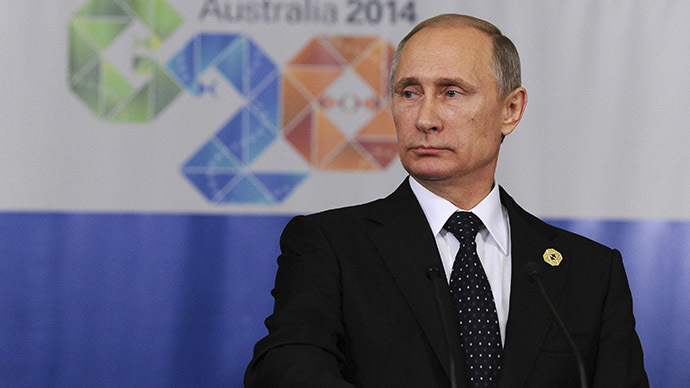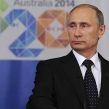
Putin’s Eastern Tour Leaves Troubled Russia in Limbo
Publication: Eurasia Daily Monitor Volume: 11 Issue: 205
By:

The G20 summit in Brisbane, Australia, was the last event in President Vladimir Putin’s lengthy Eastern tour that started on November 9, with a visit to China prior to the Asia-Pacific Economic Community (APEC) summit in Beijing. His only contribution to the discussions of the problems in the global economy, which traditionally dominate the deliberations among the twenty world leaders, was to be present at the table, thus establishing the fact that Russia could not be excluded. He was looking for small opportunities to exchange a few words with United States President Barack Obama, but the trust that underpinned the Russia-US “reset” effort has been damaged beyond repair (Newsru.com, November 15). German Chancellor Angela Merkel and other European leaders tried to impress upon Putin that a new escalation of hostilities in eastern Ukraine would bring further sanctions, and he was left reflecting on the sea change from the previous G20 summit where Russia was not only the generous host but also a confident agenda-setter (Gazeta.ru, November 14). These reflections informed his decision to escape from the second day of the summit (Moskovsky Komsomolets, November 16).
One nice moment for Putin in Brisbane was the short meeting of the BRICS (loose grouping of the emerging economies Brazil, Russia, India, China and South Africa) leaders who expressed soft disapproval of Western sanctions against Russia; but the impact factor of this mismatched organization has never lived up to expectations (Lenta.ru, November 15). It was the dangerous spasm in the Syrian civil war in mid-2013 that made it possible for Putin to momentarily capture a stellar role at the crowded G20 arena by launching a win-win initiative to remove chemical weapons from Syria under an international framework. Yet, a year later, there is no way for him to replay this success in the present situation, as Obama re-calibrates his strategy for defeating the Islamic State (Kommersant, November 13). Moscow can play a useful supporting role in finalizing a compromise solution at the six-party talks with Iran. But that would eliminate the opportunity to exploit the protracted deadlock around the Iranian nuclear program by pretending to be friends with Tehran, while abiding by the rules of the sanctions regime (Nezavisimaya Gazeta, November 12).
In fact, any compromise on the Iranian problem might constitute a threat to Russia’s interests because it would allow this potentially major oil and gas producer to begin restoring its position on the world market. This may push the oil price even lower, while its present decline has already gone beyond the worst scenarios envisaged by the government (Novye Izvestiya, November 13). Russian economists venture opinions about the sufficiency of the financial cushion accumulated during the “fat years” for avoiding deep cuts in the state expenditures in the near term (Slon.ru, November 13; Polit.ru, November 15). It would have probably been possible to manage the looming stagflation, but Rosneft and Gazprom, Russian energy giants which used to be the main producers of petro-revenues, now demand the lion’s share of the shrinking reserves (Forbes.ru, November 11). For that matter, Gazprom’s much trumpeted “strategic” deal with China looks prohibitively costly for the state budget because the agreed-upon price (tied to the oil price) cannot cover the huge expenses of infrastructure development, while the promised pre-payment has been cancelled (RBC.ru, November 9).
Putin tried to camouflage the difficulties with implementing this deal with the announcement of a new plan for supplying gas to China from the Yamal fields that now deliver gas to Europe. However, President Xi Jinping politely agreed to sign only a memorandum of understanding, which cannot amount to a commitment of any kind (Moscow Echo, November 10). The fading attractiveness of Russia’s gas business, combined with the sinking ruble, made for a poor backdrop to Putin’s Eastern tour. Therefore, in order to demonstrate Russia’s relevance, he opted for an old-fashioned exhibition of strength, ordering a nuclear cruiser and a destroyer from the Pacific Fleet to show the flag near the Australian coast (Ezhednevny Zhurnal, November 13). The ambition behind such an awkward power-play might appear pathetic, particularly since France keeps postponing the delivery of the first Mistral-class amphibious assault ship to the Russian Navy, but it fits into the disturbing pattern of growing deliberately provocative military activities (Vedomosti, November 10). Putin appears to assume that by engaging in brinksmanship he shifts the focus of the Russian-Western confrontation away from sanctions, where Russia is more vulnerable than he is ready to admit, to “hybrid war” games, where European politicians are weak and divided.
The risks inherent in Russia’s probing patrols, which involve mostly minor violations of the rules of military behavior, are not only in accidental encounters with North Atlantic Treaty Organization (NATO) interceptors but also in technical failures—most Russian vessels and aircraft have seen much abuse but little maintenance. The main risk, however, is still in the poorly controlled hostilities in and around the rebel-held “rump-Novorossiya” in eastern Ukraine, where all sides continue regrouping their motley forces and testing the fragile ceasefire (Lenta.ru, November 12). Recently, Ukrainian President Petro Poroshenko announced a series of measures amounting to a blockade of this enclave, and Putin is facing the burden of “owning” this awkward and densely populated chunk of territory while also paying a heavy price in terms of international ostracism (Gazeta.ru, November 16). Russia’s president might decide that sanctions will not become much tougher and so the costs of a “winter offensive” would not be much higher than doing nothing.
Rational calculations have been in a short supply during the Ukraine crisis, while personal idiosyncrasies and collective fears are constantly fuelled by vicious propaganda, which has become a self-propelling political force. Putin has seemingly always been obsessed with the need to secure due respect, and presently the sharp criticism he is receiving from his Western peers and the condescending semi-support from China raise suspicions that the hard-won respect is being denied (RBC Daily, November 11). Putin’s protocol-perfect but lukewarm welcome in Brisbane could be perceived as humiliating mistreatment prompting some asymmetric pro-active steps in the areas within Russia’s limited reach—such as the propensity to expose and exploit the weakness of the “arrogant” West. But the Russian leader’s response will likely be informed by the many years he spent wielding near absolute power, which has apparently made him believe that he can do no wrong and is guided by a superior understanding of the big picture. This nearly religious self-righteousness is a poor guide for managing crises as it precludes any pragmatic compromises. And it is even worse for controlling Moscow’s escalating confrontation with the West, which may set Putin’s regime on a fast-track to expiration.




